BSE IPO finds strong investor appetite, oversubscribed 51.13 times
This is the first such offering from a local stock exchange; listing expected on February 3


 Image: Shutterstock (Image for illustrative purposes only)
Image: Shutterstock (Image for illustrative purposes only)
The Rs 1,243 crore BSE initial public offering was lapped up by investors on the last day of its offering on Wednesday. This is the first such offering from a local stock exchange and it will thus become the first stock exchange to get its shares listed. (The National Stock Exchange had in December 2016 announced plans for its mega Rs 10,000 crore IPO earlier).
Data from the BSE and NSE showed that the issue was oversubscribed 51.09 times, on Wednesday evening. Bids were placed for 55,21,43,628 shares, against an issue size of 1,07,99,039 shares, for a price band of Rs 805 to 806.
Retail investors had so far bid for 1,47,38,670 shares or 2.73 times the quota set out of 53,99,519 shares.
The BSE’s managing director and CEO Ashish Chauhan declined to comment on the performance of the IPO, as officials have been advised against doing so. According to sources, the listing is expected to take place on February 3.
BSE is the world’s largest stock exchange in terms of the number of listings, with over 5,900 companies registered with it. It is the world’s 11th largest exchange by market capitalisation, with $1.52 trillion in total market capitalisation of its listed companies.
In India’s financial sector, the Multi-Commodity Exchange (MCX) which is India’s first commodity futures exchange – and founded by tainted promoter Jignesh Shah -- was also the first to be listed in 2012.
Since self-listing is not allowed by the regulator, BSE will become the first Indian stock exchange to be listed on the NSE.
Though the BSE – being Asia’s oldest stock exchange – had the first mover advantage in stock trading, it has lost its dominant position in the cash segment to rival NSE, due to late adoption of derivatives, which it lags.
But most analysts Forbes India spoke to say that while equity savings in India remains low – and other asset classes becoming less attractive – equities as a favoured form of investment is starting to improve.
BSE derives its revenues from transaction charges, depository charges and corporate fees. “The BSE generates around 21 percent of its revenues from corporate fees including the annual listing fees, which every company needs to pay to remain listed on the exchange, this is an annuity business. This segment has seen a healthy 20 percent CAGR over FY12-16 in revenues and provides a cushion against volatility in the markets,” says Siddharth Purohit of Angel Broking, in a note to clients.
Chauhan, at a recent press conference, said that the exchange will focus equally on all segments and areas which will help it to increase market share. The BSE is attempting to stay ahead of the NSE with product innovation -- in the form of currency derivatives, debt markets, mutual funds, an international exchange and later commodity trading -- which would add to the revenue mix and boost the brand.
The BSE’s revenues from operations stood at Rs 4,265.4 million for the twelve months to March 2016, a gain of 18 percent from Rs 3,611.4 million for the corresponding period a year earlier.
First Published: Jan 25, 2017, 19:33
Subscribe Now